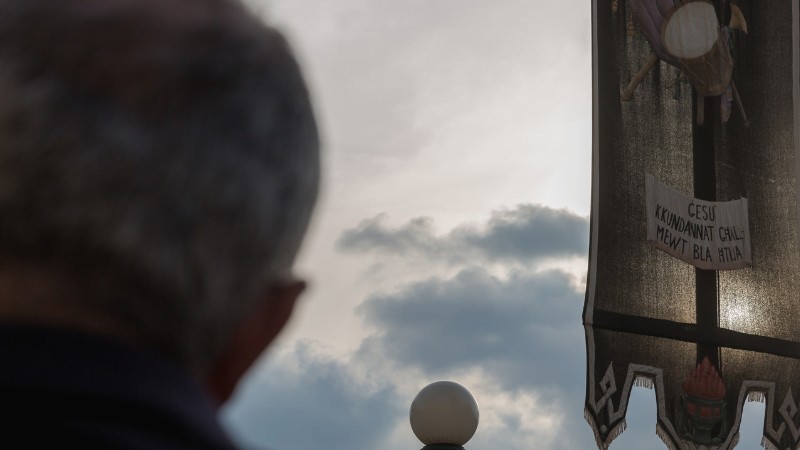This is a guest post by Kristina Abela.
The Good Friday procession at Cospicua. The ċuqlajta bearing down in a cyclical tone of penitence, and the men in hoods carrying a burden of statues. Christ in his last hours, followed by Roman generals and other biblical figures. His expression of desperation and sadness. And shock. The cruelty of humanity.
Locals stand behind their windows and doors, and they gather outside. Some with their phones pointed at the children in oversized tunics. Some staring at the angels. Others blank and fidgety.
In the Mandela Travel Centre, 20 minutes away in Ħamrun, African locals are also standing in line restlessly, but to see Ousmane Dicko, the owner of the shop, to help them book a ticket back home.
I am waiting for him for other reasons. He is the community leader of the Ivorians, and I need to talk to him about Lassana Cisse Souleymane, the man who was recently murdered at Ħal Far.
At work, since the shootings, the conversation has been tense and we have been going round in circles as to how to deal with things. The German literacy teacher says she will write a letter to her embassy about the rise in xenophobia on the island. And almost in the same breath, she writes the idea off as useless.
A young teacher ponders out loud what advice she can give the students to keep themselves safe. Another suggests locking the doors. Around 70 asylum seekers and refugees gather at the school to learn English. If someone wanted to do something, she trails off…
It would never happen in Valletta, another snaps. ‘It’ being the thing that we are all suspecting is happening at Ħal Far, but have been warned by the authorities not to voice until we have the facts.
On Triq tal-Ġebel, a road that snakes through rural villages in the south, it seems the facts have been left to bake in the sun, while CCTV cameras lie idle. It is mostly the men residing at the Ħal Far Open Centre nearby that you see walking along.
One of these men, a 17-year-old from Chad, May Malimi, was recently hit by a car there. A couple of Somali men found him unconscious and called the ambulance. He underwent surgery and came back to his English class with his arm in a cast. We asked him what happened. “An accident”, he said.
Months later we found out that the accident was the second hit-and-run on that road. Racial slurs and stones have regularly been flung at migrants at that spot. Flags with far-right symbols have been hoisted twice on a roundabout not too far off. And most recently, an individual with a semi-automatic shot Lassana in the head along with two other Ghanians.
The band is flooding the streets of Cospicua with the music of mourning. The heavy notes are universal. You don’t have to be Christian or Maltese to cast your head down when you see the representation of a man suffering a horrific death, and his mother standing close by witnessing it.
In his small office in Ħamrun, Ousmane looks down at his phone and shakes his head. Since the murder, Lassana’s mother in the Ivory Coast has been calling him several times a day.
He was her only son, and she wants to know why. She wants to know what he did for someone to want him dead.
Ousmane doesn’t know what to tell her. Sometimes he just stares at the phone ringing. It has been difficult trying to coordinate with her for the documentation necessary for the repatriation of her son, he confides. “She has become confused,” he points to his head, “I mean mental illness”.
The eyes looking down on us from the papier-mache statue of Jesus have been painted blue, and his complexion, pale, even though he was of Middle Eastern descent. Our God is white, and our Catholic spirit seems to stretch thinly over blacks – that is what Ousmane calls himself and his community, to differentiate them from us. Not Ivorians, but blacks.
“The death of one of us is like the death of an insect,” he says. “When it comes to the courts, blacks have no justice.”
He knows that if these attacks and shootings had happened to white people in a street not so remote, the response of the authorities would have been very different.
On Triq Tal-Ġebel, a week after the death of Lassana, the silence is loud and clear. Throughout the rest of the island, the Maltese have come out in droves, donning hoods and dragging chains behind a train of statues, to honour a man who was unjustly sentenced to death for his beliefs.
In the Mandela Travel Centre, Ousmane is working with NGOs and his embassy to pressure the Maltese authorities into finding out who killed Lassana, and shot the other two men. “It is quite clear to the migrant community and everyone else, that if the killer is not brought to justice, it’s going to happen again”, he says.
On one of the walls of his shop, there are posters of Nelson Mandela and Malcolm X preaching social justice: ‘Let freedom reign’, ‘By any means necessary’. At the procession in Cospicua, a banner reads “Kkundannat għall-mewt bla ħtija” (an innocent man condemned to death).
A memorial will be held at Triq Tal-Gebel in Hal Far on Saturday 27 April at 11am.












